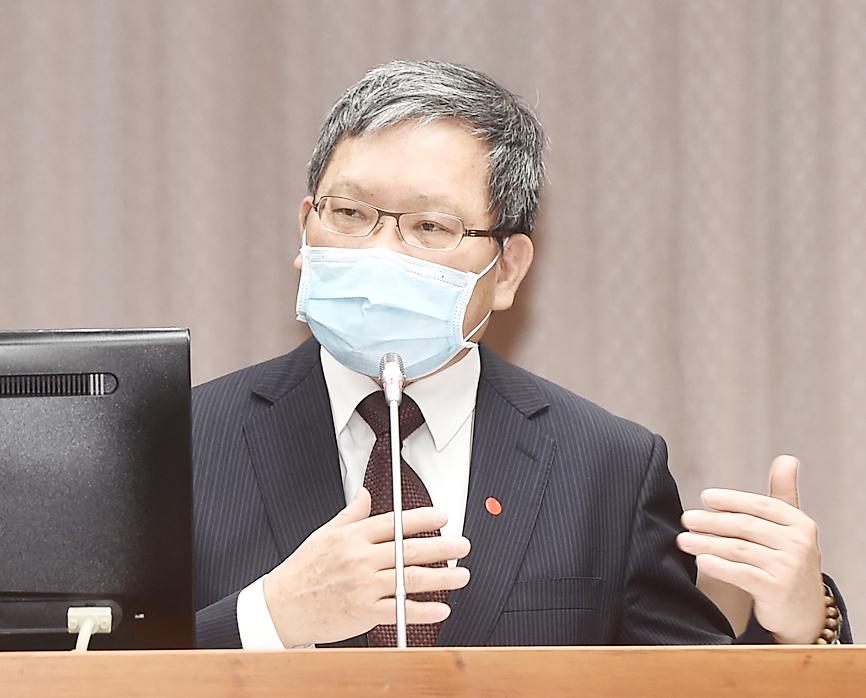Taiwan’s exclusion from the Regional Comprehensive Economic Partnership (RCEP) would have little effect on local exporters, because most firms already have a presence in Southeast Asia to take advantage of the favorable tariff terms there, government officials said yesterday.
Fifteen Asia-Pacific nations on Sunday signed the free-trade deal to form a trade bloc that accounts for nearly 30 percent of global GDP.
Minister of Finance Su Jain-rong (蘇建榮) told a meeting of the legislature’s Finance Committee that tariffs are already exempted on about 70 percent of Taiwanese shipments to RCEP markets.

Photo: Chien Jung-feng, Taipei Times
“The formation of the trade body, which is to expand the scope of tariff concessions [between the 15 member nations] from the current 90 percent to 92 percent, would have a very limited impact on Taiwan’s competitiveness,” Su said.
The difference of 2 percentage points is mild, he added.
Lawmakers from across party lines voiced concern that Taiwan would be marginalized internationally after failing to join the trade body and because of the transition in power in the US after US President Donald Trump lost the election.
RCEP members have negotiated trade terms for the past eight years during which time major Taiwanese companies have made inroads in ASEAN markets, giving them access to free trade, Su said.
The government has also encouraged local companies to diversify their investments beyond China under the New Southbound Policy, he added.
The National Development Council shared similar observations, saying that Taiwan-made semiconductors make up 60 percent of shipments to RCEP destinations and there is no tariff on semiconductors and related products due to international technology pacts and protections.
Some RCEP member nations have lowered tariffs to zero for particular technology products to remain competitive globally, the council said in a statement, explaining why tariffs are already not charged on about 70 percent of Taiwanese exports.
US-China trade tensions and the COVID-19 pandemic have awakened companies to the need for risk diversification and the danger of overdependence on a single market, the council said.
As a result, companies are restructuring their supply chains and speeding up digital transformation, it said.
Global supply realignment and the ability to develop a digital economy might become more important and relevant to supporting the economy than tariff reductions, the council said.

In Italy’s storied gold-making hubs, jewelers are reworking their designs to trim gold content as they race to blunt the effect of record prices and appeal to shoppers watching their budgets. Gold prices hit a record high on Thursday, surging near US$5,600 an ounce, more than double a year ago as geopolitical concerns and jitters over trade pushed investors toward the safe-haven asset. The rally is putting undue pressure on small artisans as they face mounting demands from customers, including international brands, to produce cheaper items, from signature pieces to wedding rings, according to interviews with four independent jewelers in Italy’s main

Macronix International Co (旺宏), the world’s biggest NOR flash memory supplier, yesterday said it would spend NT$22 billion (US$699.1 million) on capacity expansion this year to increase its production of mid-to-low-density memory chips as the world’s major memorychip suppliers are phasing out the market. The company said its planned capital expenditures are about 11 times higher than the NT$1.8 billion it spent on new facilities and equipment last year. A majority of this year’s outlay would be allocated to step up capacity of multi-level cell (MLC) NAND flash memory chips, which are used in embedded multimedia cards (eMMC), a managed

In the wake of strong global demand for AI applications, Taiwan’s export-oriented economy accelerated with the composite index of economic indicators flashing the first “red” light in December for one year, indicating the economy is in booming mode, the National Development Council (NDC) said yesterday. Moreover, the index of leading indicators, which gauges the potential state of the economy over the next six months, also moved higher in December amid growing optimism over the outlook, the NDC said. In December, the index of economic indicators rose one point from a month earlier to 38, at the lower end of the “red” light.

The global server market is expected to grow 12.8 percent annually this year, with artificial intelligence (AI) servers projected to account for 16.5 percent, driven by continued investment in AI infrastructure by major cloud service providers (CSPs), market researcher TrendForce Corp (集邦科技) said yesterday. Global AI server shipments this year are expected to increase 28 percent year-on-year to more than 2.7 million units, driven by sustained demand from CSPs and government sovereign cloud projects, TrendForce analyst Frank Kung (龔明德) told the Taipei Times. Demand for GPU-based AI servers, including Nvidia Corp’s GB and Vera Rubin rack systems, is expected to remain high,